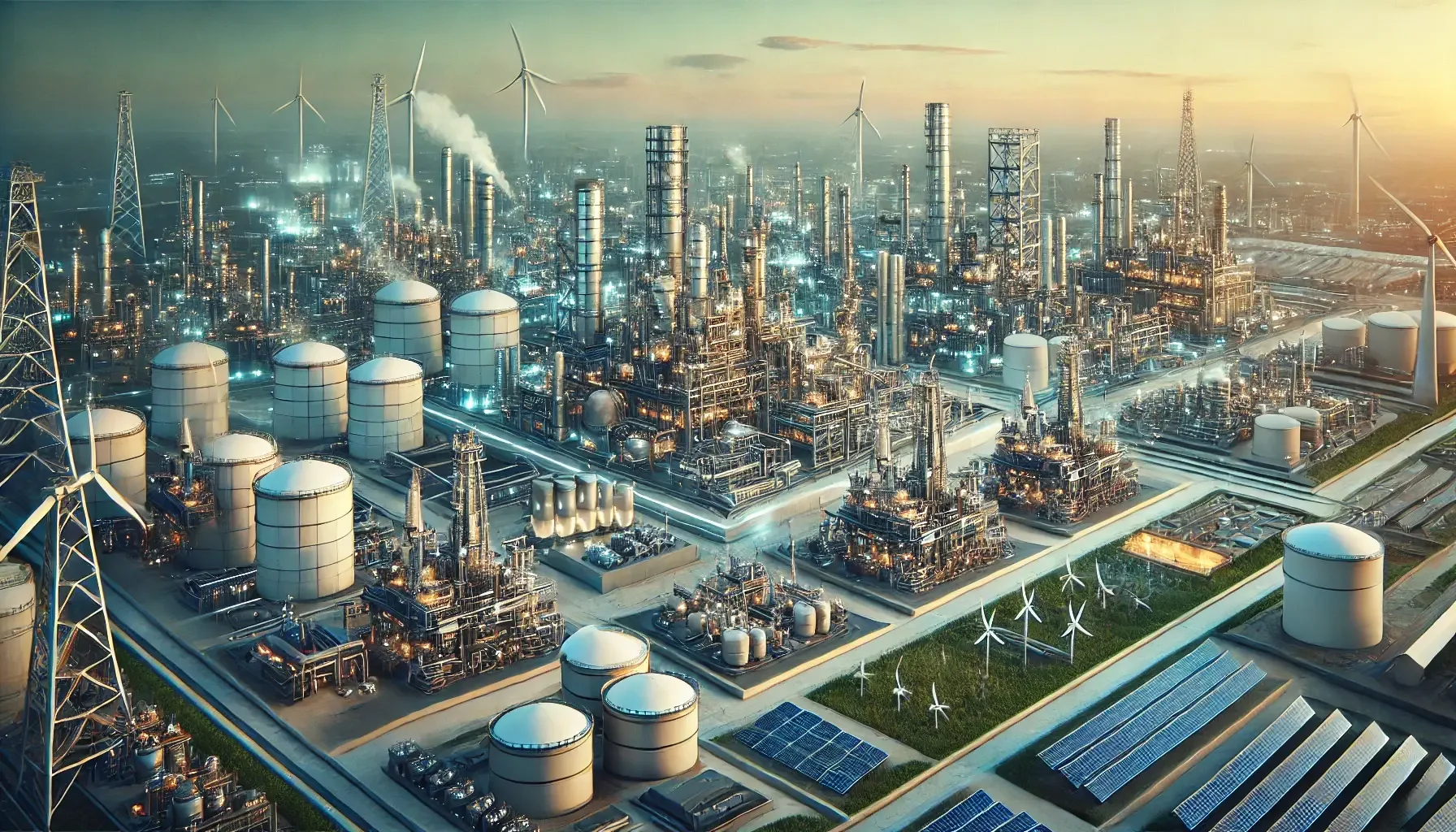The global energy industry is at a crossroads. Historically, oil refineries have been massive, sprawling facilities, heavily centralized to process crude oil at enormous scales. But today, with environmental pressures mounting and energy consumption coming under the microscope, the question arises: will refineries, as we know them today, evolve or disappear entirely? Will the sprawling, energy-guzzling plants remain the backbone of oil refining, or will we see a revolution driven by efficiency, sustainability, and decentralization?
At the forefront of this transformation lies a revolutionary technological development from the Massachusetts Institute of Technology (MIT), which promises to radically alter the way crude oil is refined and could signal the end of the monolithic refinery model. MIT's membrane technology, which could reduce energy consumption in refining by up to 90%, is poised to shake up one of the world's most energy-intensive and carbon-emitting industries.
Traditional Oil Refining: Energy-Intensive and Environmental Impact
The traditional oil refining process is a massive energy sink. Conventional refineries rely on distillation, a heat-driven process that separates crude oil into different products based on their boiling points. This method is energy-intensive, consuming approximately 1% of the world's total energy supply and contributing to 6% of global CO2 emissions.
These figures aren't just abstract numbers; they have tangible environmental and economic costs. The sheer scale of these facilities is a reflection of their central role in the global energy infrastructure, but it also exposes the industry's heavy dependence on vast, centralized operations. This model, which has remained largely unchanged for decades, is not only inefficient but also unsustainable in an era where environmental regulation and decarbonization are urgent priorities. This is where an oil and gas marketing agency can play a pivotal role in guiding companies through this shift, helping them to communicate the benefits of sustainable practices and the integration of innovative technologies.
1. MIT's Membrane Technology: A Paradigm Shift in Oil Refining
Enter MIT's membrane filtration technology, a potentially game-changing advancement that offers a solution to the energy inefficiency of oil refining. Instead of relying on high heat, MIT's membrane separates crude oil components based on their molecular size, operating at ambient temperatures. This method is akin to reverse osmosis, a widely used process in water desalination .
The implications of this technology are profound. By dramatically reducing energy consumption, by up to 90%, it could make refining not only more cost-effective but also far more sustainable. Traditional distillation processes operate at extremely high temperatures, consuming vast amounts of energy. MIT's technology promises a more efficient, energy-sparing alternative, capable of scaling to meet the industry's needs without the overwhelming environmental costs.
This could fundamentally alter the economics of oil refining. It challenges the very essence of the large, centralized refinery model, which thrives on economies of scale. With smaller, more efficient units, oil refining could become more decentralized, with refineries scattered closer to production sites or end consumers. To adapt to these changes, companies may need to partner with experts in digital transformation like Centric, a leading digital transformation agency, to seamlessly integrate new technologies and optimize operations. But how realistic is this shift? Will massive refineries, as we know them today, soon become obsolete?
2. The Emergence of Modular, Decentralized Refining
The shift toward decentralized refining is already underway, spurred by both technological advancements and the need for energy independence. Modular refineries, which are smaller, more agile versions of traditional refineries, are increasingly being considered as the future of oil refining. These units can be deployed in remote or off-grid locations, reducing the need for long-distance transportation of crude oil and its associated emissions.
Moreover, smaller refineries offer better flexibility, responding to local energy demands while being easily integrated into regional grids or renewable energy sources. These modular systems also have the added advantage of being more adaptable to fluctuating market demands, as they can scale up or down with relative ease. For instance, the adoption of small-scale, modular refineries in developing countries is already being tested as a means of improving energy security and reducing reliance on imports .
The potential benefits of this shift are immense. In an ideal world, modular refineries could be powered by cleaner energy sources like solar or wind, integrating more seamlessly with renewable energy grids. This would allow oil refining to become less reliant on fossil fuels, reducing its carbon footprint dramatically. Moreover, the smaller scale of operations would reduce the capital costs required for building large refineries, allowing for more flexible and decentralized refining systems.
Explore Our Digital Transformation Services!
3. Economic and Environmental Challenges: Can Modular Refineries Replace the Giants?
Despite the promising outlook, there are significant hurdles to overcome. First, the capital costs of modular refineries, although lower than traditional refineries, are still considerable. While these units may be more energy-efficient, they are unlikely to be as cost-effective in the short term as larger, legacy refineries that benefit from decades of optimization and scale.
Additionally, the regulatory landscape for modular refineries is still underdeveloped. Governments and international bodies would need to create frameworks that support the rapid deployment of smaller, decentralized refining systems. This would involve addressing a range of issues, from environmental compliance to ensuring the safety of these new systems in a world where large refineries have long been the standard .
And perhaps most importantly, the oil industry itself may not be ready to relinquish the benefits of its large-scale operations. For decades, the giants of the refining world have built their business models around the economies of scale that come with large, centralized facilities. Convincing these companies to invest in modular systems, especially when the return on investment may take years, will require not just technological innovation but a fundamental shift in the way the industry views its operations.
The Role of Digital Transformation in Refinery Evolution
One of the overlooked factors in this conversation is the growing role of digital technologies in the oil refining industry. As the industry grapples with the need for greater efficiency and sustainability, digital transformation could provide the necessary tools for refineries to evolve. As the industry grapples with the need for greater efficiency and sustainability, digital transformation could provide the necessary tools for refineries to evolve.
Through the use of AI, machine learning, and big data analytics, refineries, whether large or modular, can optimize their operations in ways previously unimaginable. Predictive maintenance, for example, can minimize downtime and reduce energy consumption by ensuring that equipment is running at peak efficiency. Additionally, digital twins, virtual representations of physical assets, can allow for real-time monitoring of refinery processes, further improving energy management and operational flexibility .
These technologies could play a critical role in the transition from large refineries to more modular, digitized systems. By enabling greater flexibility, operational efficiency, and reduced environmental impact, digital tools could act as the bridge between today's oil refining model and the future we are heading toward.
Conclusion
The advent of MIT's membrane technology and the growing adoption of modular, decentralized refineries present a profound shift in the oil refining industry. Whether the massive refineries that have defined the energy landscape for decades will remain relevant in the future is increasingly uncertain. As the oil industry moves toward smaller, more efficient, and sustainable systems, the massive, centralized refineries may become relics of a bygone era.
Modular refineries, powered by advancements in technology and renewable energy, could become the new norm. Yet, the path forward will require overcoming significant economic, regulatory, and infrastructure challenges.
Ultimately, the future of oil refineries will not be defined by their size, but by their ability to adapt, to innovate, scale, and become part of a cleaner, more resilient energy landscape.








